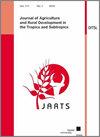Influence of stage of ripening and dietary concentration of Noni (Morinda citrifolia L.) powder on broiler performance
Q3 Social Sciences
Journal of Agriculture and Rural Development in the Tropics and Subtropics
Pub Date : 2020-04-08
DOI:10.17170/KOBRA-202004061142
引用次数: 0
Abstract
Phyto-additives in poultry diets enhance growth, feed eciency and product quality and minimise the possible risk of residues from chemical additives. There are reports on the use of noni (Morinda citrifolia) fruit powder as phytoadditive in poultry diets but information on the eect of fruit ripening is scanty. Hence, this study compared the eect of unripe and ripe noni fruit owder on broiler performance. A control diet without and 4 diets containing two levels (0.25 and 0.5 %) unripe and ripe fruit powder were fed to 5 replicates containing 6 Cobb500 broilers in a completely randomized design. Data collection was on growth performance, nutrient digestibility, and carcass and organ measurements. In the starter (8–21 d), feed intake (FI) reduced on 0.5% unripe powder (p 0:05). Nitrogen retention reduced on 0.25% unripe powder compared to the control and the ripe powder (p < 0:05). Poorer dressing percentage was observed on 0.5%ripe powder (p < 0:05). Breast weight was increased and thigh weight reduced on 0.25% ripe and 0.5% unripe powder (p < 0:05). In conclusion, up to 0.5% noni, fruit powder has no beneficial eect on broiler growth, but the stage of ripening may influences protein digestibility and dressing percentage. We recommend more research into feed processing and diet composition.诺丽粉成熟期及日粮浓度对肉鸡生产性能的影响
家禽日粮中的植物添加剂可促进生长、提高饲料效率和产品质量,并将化学添加剂残留的可能风险降至最低。在家禽饲粮中使用诺丽果粉作为植物添加剂已有报道,但关于其对果实成熟的影响的信息却很少。因此,本研究比较了未成熟和成熟诺丽果粉对肉鸡生产性能的影响。采用完全随机设计,饲喂5个重复,每重复6只Cobb500肉鸡的对照饲粮和4个添加2个水平(0.25和0.5%)未熟果粉和成熟果粉的饲粮。收集生长性能、营养物质消化率、胴体和器官测量数据。在起始期(8-21 d), 0.5%未熟粉降低了采食量(FI) (p 0:05)。与对照和成熟粉相比,0.25%未成熟粉的氮素滞留率降低(p < 0.05)。0.5%熟透粉的敷料率较低(p < 0:05)。0.25%熟透粉和0.5%未熟透粉增加了胸重,降低了腿重(p < 0:05)。综上所述,添加0.5%诺丽果粉对肉仔鸡生长无促进作用,但成熟阶段可能影响蛋白质消化率和屠宰率。我们建议对饲料加工和日粮组成进行更多的研究。
本文章由计算机程序翻译,如有差异,请以英文原文为准。
求助全文
约1分钟内获得全文
求助全文
来源期刊
CiteScore
2.30
自引率
0.00%
发文量
0
审稿时长
>36 weeks
期刊介绍:
The Journal of Agriculture and Rural Development in the Tropics and Subtropics publishes papers dealing with original research and review papers in the fields of plant production, animal nutrition and animal husbandry, soil science, rural economy and farm management, forestry and forest economy, veterinary hygiene and protection against epidemics.

 求助内容:
求助内容: 应助结果提醒方式:
应助结果提醒方式:


